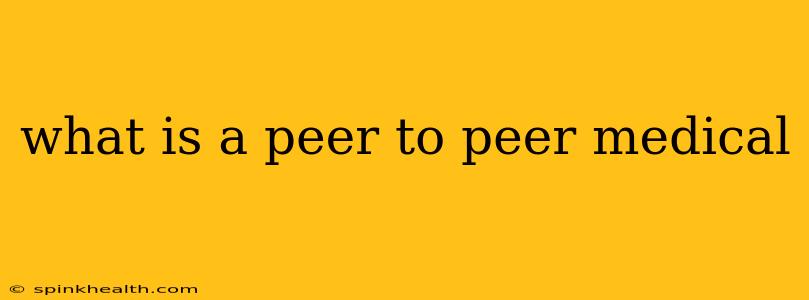What is Peer-to-Peer Medical Support? A Revolution in Healthcare
Imagine a world where finding reliable medical information and emotional support isn't limited to doctor's appointments and sterile hospital rooms. That's the promise of peer-to-peer (P2P) medical support, a growing movement transforming how people navigate health challenges. It's not about replacing professional medical advice; rather, it’s about supplementing it with the invaluable experience and understanding of others who've walked a similar path.
This isn't your typical online forum; P2P medical support is built on a foundation of shared lived experience, creating a unique sense of community and understanding. Let's delve into what exactly it entails and explore its many facets.
What are the benefits of peer support groups for people with health conditions?
Peer support offers a wealth of benefits, often exceeding what traditional healthcare can provide. The power of shared experience creates a safe space for individuals to:
-
Reduce feelings of isolation: Chronic illness or a serious health scare can be incredibly isolating. Connecting with others facing similar challenges helps individuals realize they're not alone. This shared experience combats the feeling of being different or misunderstood.
-
Improve adherence to treatment plans: Support groups provide a platform for sharing coping strategies, tips for managing symptoms, and motivation to stick to prescribed treatments. The accountability and shared encouragement within the group can make a significant difference.
-
Gain valuable insights and coping mechanisms: Learning from the experiences of others who have successfully navigated similar health issues provides invaluable practical knowledge and emotional support. It helps individuals feel more prepared and empowered to manage their own conditions.
-
Boost emotional well-being: The emotional support offered within a peer-to-peer network can be incredibly powerful. Sharing feelings, vulnerabilities, and triumphs creates a sense of community and belonging, significantly improving mental health.
-
Enhance self-efficacy: Seeing others overcome challenges can boost self-confidence and belief in one's ability to cope with their own health journey. This feeling of empowerment is a cornerstone of successful health management.
How can I find a peer support group for my health condition?
Finding the right peer support group can seem daunting, but resources are readily available. Start by:
-
Consulting your healthcare provider: Doctors and other healthcare professionals are often aware of local or online support groups related to specific conditions.
-
Searching online: Numerous online platforms and organizations connect individuals with peer support groups based on specific health concerns. Be cautious and prioritize groups with established reputations.
-
Checking with local hospitals and health centers: Many hospitals and health centers offer support groups or can provide information about local resources.
-
Looking for national organizations: Many national organizations dedicated to specific health conditions offer peer support networks or can direct you to relevant groups.
What are the limitations of peer support?
While immensely valuable, peer-to-peer support isn't a replacement for professional medical advice. It's crucial to remember that:
-
It's not a substitute for medical care: Peer support offers emotional and practical support, but it cannot diagnose, treat, or cure illnesses. Always consult a healthcare professional for diagnosis and treatment.
-
Information may not always be accurate: While peers share valuable experiences, the information shared should not be considered medical advice. Always verify information with a healthcare provider.
-
Group dynamics can be challenging: Not all support groups are created equal. Finding a group with a supportive and respectful environment is crucial for a positive experience.
Is peer-to-peer medical support covered by insurance?
Insurance coverage for peer-to-peer medical support varies greatly depending on the specific program, insurance plan, and location. Some insurance providers might cover support groups offered through their networks or partner organizations, while others may not. It's best to check directly with your insurance provider to determine coverage.
In conclusion, peer-to-peer medical support is a powerful tool that complements, not replaces, traditional healthcare. By fostering connections, sharing experiences, and offering mutual support, it enriches the lives of individuals navigating health challenges, promoting resilience, well-being, and a sense of community. However, it's crucial to remember its limitations and always prioritize professional medical advice for accurate diagnosis and treatment.

